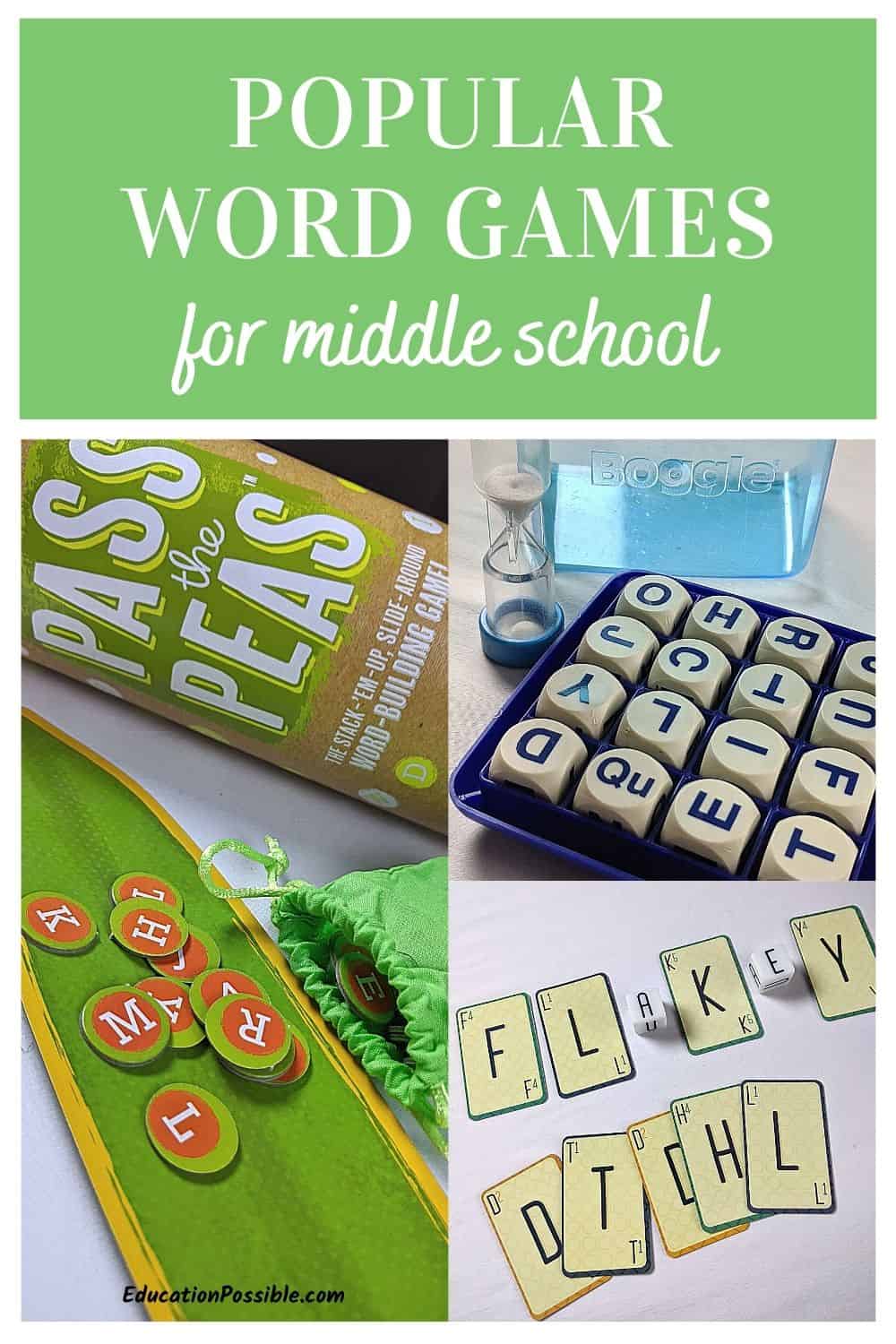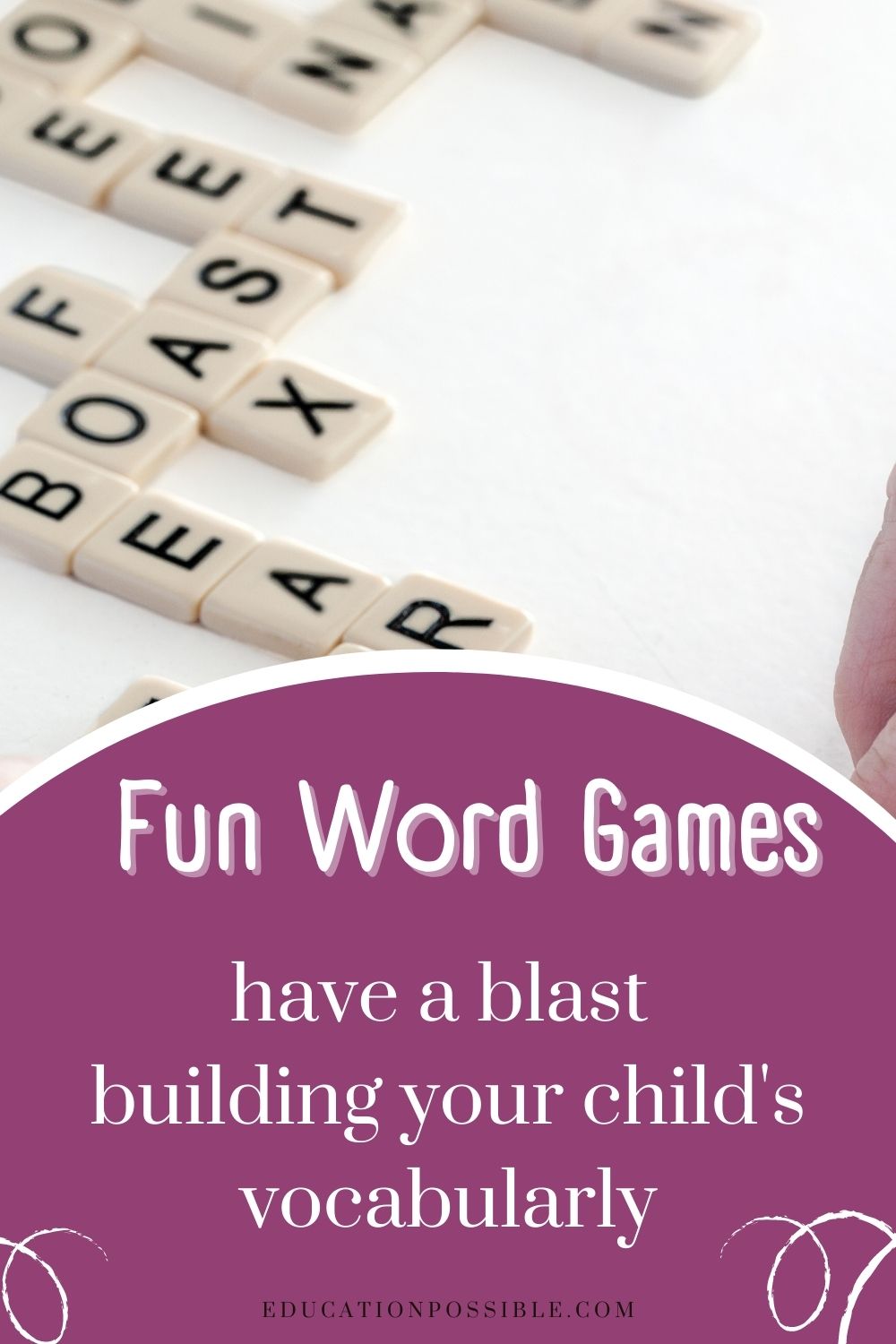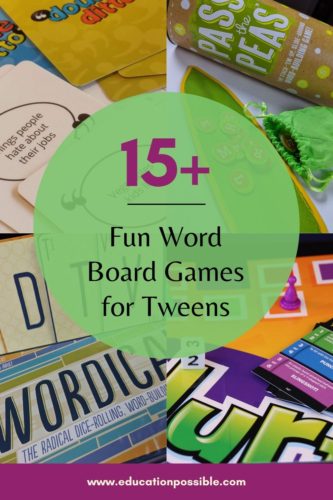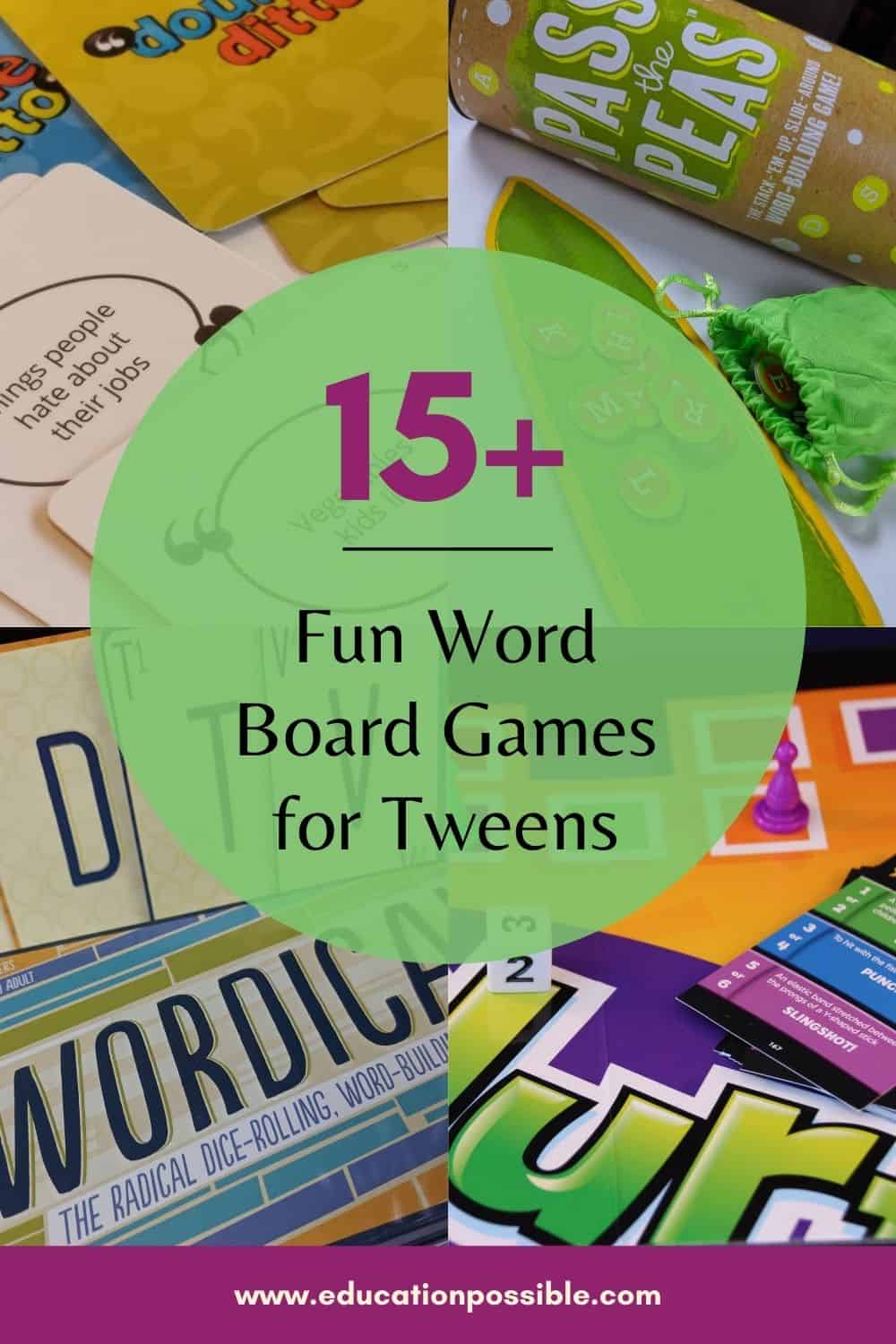Fun Word Board Games
These word board games are an excellent way to build up your middle schooler’s vocabulary. They’re educational board games for teenagers.
As teens get ready for high school, it’s important that they have strong language skills, both reading and writing. That means during the middle school years, they should spend time improving their spelling and vocabulary skills.
Instead of relying on a large curriculum or boring worksheets to help your teens further develop their word building skills, play some of these board games instead. They’re a great way to work on language arts.
When middle schoolers play these vocabulary word games, they’re not just sitting there answering questions and spouting memorized facts. They’re playing with words and being creative.
Fun language arts games help teens get comfortable with spelling, vocabulary, and building words. All of which improve their reading and writing skills.
Word Board Games
Personally, I think the days of giving kids long lists of words to memorize for spelling and vocabulary are long gone.
Tweens learn better when they’re immersed in a subject instead of just retaining facts.
One way to engage your homeschooler in language is to play games specifically designed for word building. As they play, they’ll be shoring up their spelling skills, building their vocabulary and improving their reading skills, all while having some fun.
Board games also have an element of friendly competition built in, so your older kids will be busy trying to beat you and each other, and they’ll probably forget they’re actually learning.
Not only are these word games perfect for language arts class, they’re so enjoyable that they make great additions to your family game night.
The ultimate goal is to raise kids who can communicate effectively, whether written or verbally, so I’m all for using whatever tools work to accomplish this.
These board games and card games are fun to play and excellent tools to add to your language arts plans.
How to Use Board Games in the Classroom
So how can you incorporate board games like these into your classroom or homeschool? It’s actually easier than you think!
- Set aside your language arts curriculum for the day (especially any spelling or vocabulary plans) and play a game instead.
- Transform a standard game by using the facts you’re teaching as the clues.
- Play a word game during lunch. It’s simple to pull out one of these games while you’re sitting at the table eating, and it won’t take any time away from your school day.
- When kids finish their work early or after you give a test, use a word game as a reward.
- If you usually take a day off during the week or have one where your teen has a lighter course load, take an hour to play a game or two.
- Add these word board games to your next family game night. Everyone can benefit from expanding and strengthening their vocabulary. Plus, tweens will love trying to beat you in a word game.
Use games with small groups, individual play, or as a fun activity for the family.

Any links in this post may be affiliate links. See my disclosure statement.
MORE LANGUAGE ARTS ACTIVITIES
Aside from word games, there are plenty of fun activities you can use to build the vocabulary of older children.
- Improve creative writing skills with Story Builders.
- Printable word games.
- Teach writing to teens with dysgraphia.
- These word tools will build confidence.
Word Games
The word games listed here are teen-approved and popular with teachers and homeschooling families. Many of them have been around for quite a while and have huge numbers of fans.
They're popular word games for a reason!
They may be educational games, but they're also a fun way to work on things like sight words, reading skills, word parts, and communication skills.
They're also excellent tools for learning new words. Kids will have a blast with these word puzzles.
This is one of our favorite word games. Players race to write down two words that fit the category on the card, and if they match another player's answer, they both earn points.
It's an awesome family game.
You play this game with two stacks of cards - category cards and letter cards.
The top card on the category pile is turned over first. As soon as a letter card is flipped, players rush to be the first person to shout out something that fits the category and starts with the letter.
Players race to be the first one to find the word that hides in the letter spiral.
Sounds easy, but it can be quite challenging to find where the word begins and ends when you're scrambling to beat your opponent.
Scattergories is a classic game that helps build vocabulary words.
Players start the round with a category list. Once the letter die is tossed, they must rush to write as many words as they can that fit the category and start with the chosen letter.
You need to be quick to finish before the time limit. But only unique answers count, so you'll have to use your vocabulary to win.
As players move around the board, they try to guess the correct vocabulary word from the definition card.
If they give the wrong word, the other players have time to answer.
This game puts a unique twist on the classic crossword puzzle game.
Players try to score the most points by creating words, but they have the added choice of adding their letters on top of other ones.
The higher the pile, the more points players earn.
This game is played with 8 stacks of cards in the middle. When it's your turn, you choose any of the top cards and create a word. The next player does the same, but then can use the remaining letters to play on your word.
Play continues until you use all the cards.
This is another game that's played with category cards and letter cards.
However, with this game, when the cards are turned over, players try to be the last one to shout out a word that starts with the letter and matches the category.
The timer is random, so you never know when the time will end.
Players spin the spinner to determine the two letters and category for each round. Then, players race to write as many words as possible that start with one letter and contain the other and also fit the category.
Scrabble is a classic word game that's still an excellent tool for building everyone's spelling and vocabulary skills.
Players use their chosen tiles to make words, while trying to get the highest score possible.
This is a fun game to play and is incredibly portable, thanks to the handy banana pouch.
There are lots of variations on the gameplay of Bananagrams, so you'll never get bored playing. In the classic play, players use their tiles to make words in a crossword-style form.
Boggle is a fun sight word game that's been around for years.
Players put the lid on and shake the letter dice. Once they settle, start the timer and try to find as many simple words in the letters as you can.
Write them down on a piece of paper before time runs out.
Players are given 20 tiles, and a 5 tiered holder to begin.
When someone says go, everyone races to build 5 different words with their tiles and place them in the slots on the plastic holder.
As soon as someone builds their words, they shout, Dabble, and the round ends.
This vocabulary game includes 108 consonant cards and 2 vowel dice.
Players roll the vowel dice and use them with the consonant cards in their hand to build the highest scoring word.
This is a cute game that will definitely challenge tweens.
You give all players a paper pod and colored letters. When the timer begins, they use their letters to build a word on the pod. Then, they give the pod to the next player and the next round begins.
Now players use the word in front of them and their remaining letters to build a new word.
When your pod gets back around to you, you count the number of letters in your color and that's your score for the round.
This game will definitely get your tween's creative juices flowing.
There are 9 dice with pictures on each side. To begin, a player rolls the dice and tells a story, trying to include as many of the pictures as possible.
This is a great game to take along to parties or on a family trip.
There are a bunch of other dice/picture variations you can choose from too.
Here's how we use Story Cubes in our homeschool.
Hopefully, you’ve seen how easy it is to help your teens build their language arts skills through games. Plus, they’re a lot of fun for middle school students!
Remember that your vocabulary is like a muscle. The more you use it and work it, the stronger it gets. And word board games are a good way to get older kids excited about English language arts.
Don’t let tweens just sit there answering questions and spouting memorized facts. Take some time to play these word games in your homeschool and watch how quickly everyone’s language improves.



















